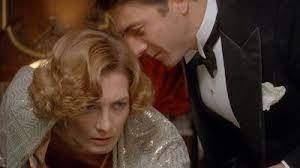This is a great movie to watch when you’re going through a big, unexpected change in your life. But also understand that this has very little to do with the travel memoir of the same name. SPOILERS HO!
Frances (Diane Lane) is a writer, teacher, and book reviewer who finds out about her husband’s infidelities by an angry author whose book she gave a poor critique. I get that the dude was upset but I can’t imagine being so upset that you’d reveal to a person you barely knew that their husband was getting read to leave them. To break her out of depression after the divorce, her best friend Patti (played by everyone’s favorite Sandra Oh) sends Frances to replace her on a gay tour of romantic Tuscany since Patti can’t travel with a new pregnancy. Patti states that Frances needs to get her life back on track and start writing again.
Frances does get a kitten out her her misadventures.
The first inspiration she has is when one of the men she hangs out with on the tour asks her to write a postcard home for him. She crafts a beautiful paragraph full of metaphors and onomatopoeia. The owner of the postcard declares that he can’t send it now. His mother would never believe that he wrote it! Ingrate!
Anyway, her second inspiration comes in the form of a villa. The majority of the film is about Frances buying, refurbishing, and living in an old Villa. As she lives there, she makes friends with her neighbors, the Polish contractors fixing the house, and Katherine, a fabulous local eccentric played by Lindsay Duncan who once acted as a muse to Fellini. I like the bond Frances forms with one of the Polish workers, teenage Pawel, which is like an aunt and nephew and explains why she supports when he falls in love with the neighbors daughter. That is to say, her time is not just platonic friendships and make-shift family. Frances has a romantic encounter with the handsome Marcello, who is charming and adorable, but has no patience. He can’t handle when a very pregnant Patti shows up and is in need of Frances’s time. By the way, the way Frances and Patti talk is very natural. You can believe that they’ve been friends for years.
In the end, all of Frances’s depression and feeling like she’ll never have all she wanted are cured in various, unexpected ways. She has family and life all around her. She finishes a book (called “Under the Tuscan Sun” - What? Who saw that coming?). AND she meets another fellow writer named Ed who she wrote an other unkind review of. He is healthy person and tells her it was the “best bad review” he’d ever gotten and he used it to help write his next book. So they end up together at the end. Full circle.
*Note: I feel bad for the real Ed (Edward Kleinschmidt Mayes). He’s Frances Mayes second husband and in reality they fixed up the villa together. But no. He became the “reward” at then end of the movie. I don’t know how I’d feel about that if I was Ed.



































